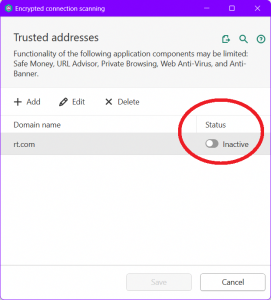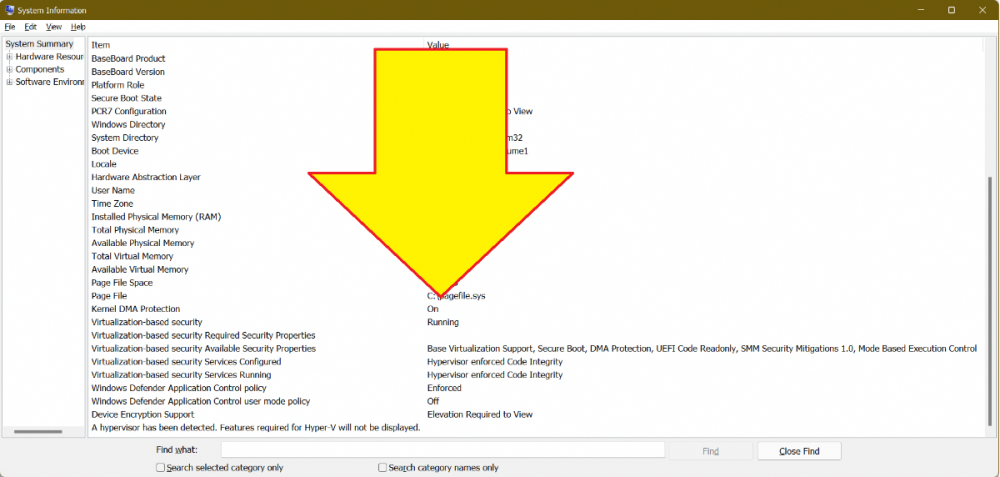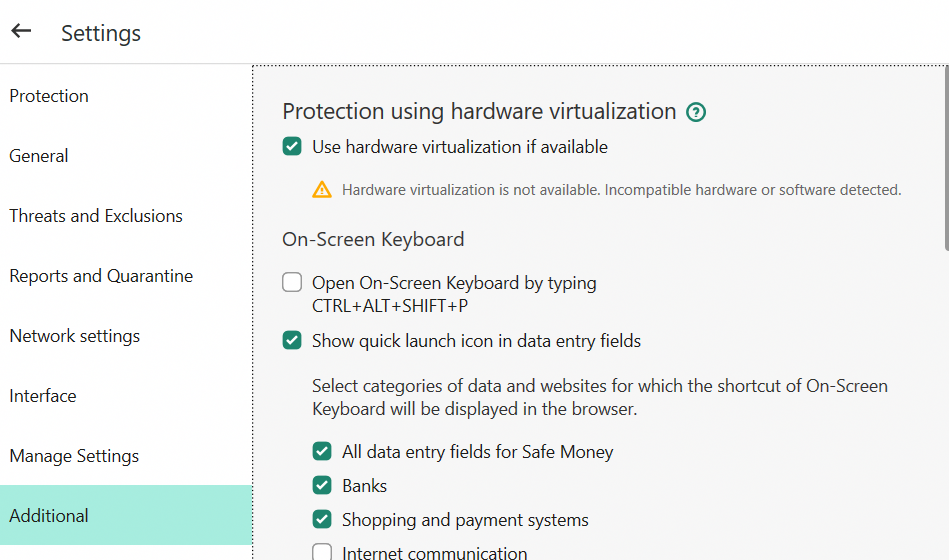
Raiden
Members-
Posts
15 -
Joined
-
Last visited
Reputation
13 GoodRecent Profile Visitors
The recent visitors block is disabled and is not being shown to other users.
-
Kaspersky Security Cloud restricting access to RT
Raiden replied to Raiden's topic in Kaspersky Security Cloud
Seems like the problem is gone — I can access rt without intervention from Kaspersky antivirus encryption scan (as you can see I have deactivated the encryption whitelist, as I don't need it any more for now. I'll monitor the situation daily for the next couple of days. -
The irony of Kaspersky banning RT. I am living in Western Europe where RT (www.rt.com) is banned. So I finally set up a vpn to access that site and then lo and behold a Russian antivirus software of all things is what is now blocking it. The irony. This started this week. Three or so days ago. I tried to troubleshoot and found out that Kaspersky is not claiming the domain has malware but rather that it is preventing access to the site under the guise of one of Kaspersky's extra features: the "Encrypted connection scanning" thing. What's this nonsense? I really don't want to put a URL in my anitvirus to be bypassed (right now in order to access the site one has to either disable encrypted connection scanning in Kaspersky or else whitelist the website so that the encrhypted scanning option proceeds elsewhere but not on RT. That's a bad practice Kaspersky is forcing me to do (because if in the future a whitelisted website does become malicious then Kaspersky will not be able to do due diligence and serve me. That's why I'd rather that Kaspersky stops censorship in the EU and just let us have access to the site without us having to whitelist it.
-
I decided to remove Kaspersky. Because while this core isolation problem was solved, I discovered a new problem while trying to solve that: Kaspersky conflicts with AdGuard (an anti ad protection program that I have on my computer). Specifically I had set up AdGuard to be my DNS resolver instead of the usual (Windows Settings > Network & Internet). The reason is because I don't want to change the Windows's basic DNS settings - I want that to remain "Automatic" by default so I don't get connection problems with some public networks. So I want to continue using AdGuard. Which means I have no choice but to stop using Kaspersky Security Cloud. Because KSC has no option to "allow" me to use AdGuard HTTP / DNS protection side by side (something I can do with AdGuard + Windows Defender).
-
You forgot because Kaspersky has NOT put such an important piece of information in their info page (that the anti virus tells us to read): https://support.kaspersky.com/us/common/safemoney/13713 That info page needs to be updated ASAP. Also in another area: the "Windows 10" subtitle is already outdated (since early last year already we have another Windows version on the market: Windows 11 so it should read "Windows 10 & 11"
-
My built-in laptop camera is disabled, and under Kaspersky Security Cloud Free’s “privacy protection” setting, I can see that the “Webcam protection” is turned “on” but greyed out. That id a bit inconvenient. Because it means Kaspersky turns on something but makes it impossible to turn it off. That’s an odd thing to do. The normal thing would be to disable the feature and turn it “off” until I decide to upgrade. So now What is the solution? How do I prevent Kaspersky free from blocking camera?
-
This didn’t help. I don’t have access to the features in “more tools > manage applications” or in the settings “webcam protection” as I have the ‘free” version. under Kaspersky’s “privacy protection” setting I can see that the “Webcam protection” is “on” but greyed out. That’s a bit inconvenient. Something is turned on but inaccessible to modification. That’s an odd thing to do. The normal thing would be to disable the feature and turn it “off” until I decide to upgrade. So now What is the solution? How do I prevent Kaspersky free from blocking camera?
-
I had Kaspersky free. Then last month it asked me to upgrade to “Kaspersky Security Cloud Free”. I did that. Then it turned out, I had to buy licences for the so called “free” thing. I immediately removed and uninstalled all of Kaspersky from my computer. I assumed it could be a virus or corruptions of some sort. It didn’t look like that though. I kept watching and all the website was right here on this domain (kaspersky.com) So what’s going on? Is it free or is it not?




